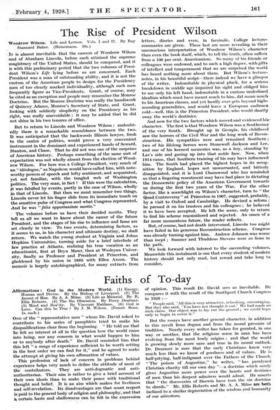The Rise of. President Wilson Woodrow Wilson. Life and Letters.
Vols. I and II. By Ray Stannard Baker. (Heinemann. 36s.) IT is almost inevitable that the careers of Woodrow Wilson and of Abraham Lincoln, before each attained the supreme magistracy of the United States, should be compared, and it is with this preliminary period that the two volumes of Presi- dent Wilson's Life lying before us are concerned. Each President was a man of outstanding ability, and it is not the custom, of the American people to design, for the Presidency men of too clearly marked individuality, although such men frequently figure as Vice-Presidents. Grant, of course, may be cited as an exception and people may remember the Monroe Doctrine. But the Monroe Doctrine was really the handiwork of Quincey. Adams, Monroe's Secretary of State, and Grant, looking with soldierly simplicity on the Presidency as his .right, was really unavoidable : it may be added that he did not shine in his two tenures of office.
But to return to Lincoln and Woodrow Wilson ; undoubt- edly there is a remarkable resemblance between the two. It was anticipated that the backwoods Illinois lawyer, fresh to the centre of politics, would prove a very convenient instrument in the dominant and experienced hands of Seward, Stanton, and Chase. That he did not was one of the surprises of American history. Perhaps something of the same sort of expectation was not wholly absent from the election of Wood- row Wilson. For here was a College President, very much of an " ideologue," as Napoleon would have called him, with note- worthy powers of speech and lofty sentiment, and acquainted, yet not familiar, with the tangled web of Washington politics. The very man, in fact ! If this were the calculation, jrt was falsified by events, partly in the case of Wilson, wholly in that of Lincoln. But then we must remember two things. Lincoln never let his finger slide from its immediate touch on the sensitive pulse of Congress and what Congress represented. And he was " feliz opportunitate mortis."
The volumes before us have their decided merits. They tell us all we want to know about the career of the future President, and the stages of his rise to influence and fame are set clearly in view. To two events, determining factors, as it seems to us, in his character and ultimate destiny, we shall return. We watch the young student at Virginia and Johns Hopkins Universities, turning aside for a brief interlude of law practice at Atlanta, realizing his true vocation as an educationist, first at Bryn Mawr, then at Wesleyan Univer- sity, finally as Professor and President at Princeton, and gladdened by his union in 1883 with Ellen Axson. The memoir is largely autobiographical, for many extracts from letters, diaries and even, in facsimile, College lecture- summaries are given. These last are more revealing in their unconscious interpretation of Woodrow Wilson's character than even the book itself, which, to tell the truth, often suffers from a 100 per cent. Americanism. So many of his friends or colleagues were endowed, and to such a high degree, with gifts of intellect and temperament that we are surprised the world has heard nothing more about them. But Wilson's lecture- notes, in his beautiful script—there indeed we have a glimpse of the writer. Indomitable in physical pluck, for a serious breakdown in middle age impaired his sight and obliged him to use only his left hand, indomitable in a curious underlined idealism which must have meant much to him, did mean much to his American classes, and yet hardly ever gets beyond high- sounding generalities, and would leave a European audience cold—well, this is the Princeton President, who would shortly sway the world's destinies.
And now for the two factors which moved and evidenced his - character. The first is that Woodrow Wilson was a Southerner of the very South. Brought up in Georgia, his childhood saw the horrors of the Civil War and the long work of Recon- struction. His sympathies were and remained Southern ; two of his lifelong heroes were Stonewall Jackson and Lee. and one of his keenest memories was, as a boy, standing by Lee's side and gazing up into that noble face. Now, when 1914 came, that Southern training of his may have influenced him. The South had placed the highest hopes in its recog- nition by England, hopes not unwarranted, and bitterly disappointed, and it is Lord Charnwood who has reminded us that a lingering resentment may have had place in dictating the Democratic policy of the American Government towards us during the first two years of the War. For the other factor, like a searchlight on Wilson's character, turn to " the Quad.Controversy " at Princeton in 1907, suggested, probably, by a visit to Oxford and Cambridge. He devised a reform ; he pressed it on his trustees and his colleagues ; he believed it to have been accepted. He left the scene, only to return to find his scheme reconsidered and rejected. An omen of a far more momentous future, the reader reflects.
. But, of course, had not death intervened, Lincoln too might have failed in his generous Reconstruction scheme. Congress was already turning against him. Andrew Johnson was worse than inept ; Sumner and Thaddeus Stevens were as lions in the path.
We look forward with interest to the succeeding volumes. Meanwhile this instalment is one that every student of modern history should not only read, but reread and take long to consider.






































 Previous page
Previous page